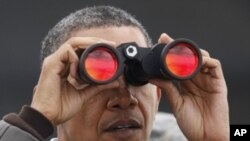U.S. President Barack Obama began his visit to South Korea with a quick trip to the demilitarized zone separating the two Koreas, which technically remain at war nearly 60 years after an armistice.
The president of the United States greeted troops in the DMZ. "You guys are at freedom's frontier," Obama told them.
Outcomes of the Last Nuclear Security Summit
The last nuclear security summit was held in 2010 in Washington. It brought together 47 countries and three organizations. At the summit, participants:
- Agreed to work towards the goal of securing all vulnerable nuclear materials.
- Reaffirmed the responsibility of nations, consistent with their international obligations, to maintain effective security of nuclear materials and facilities under their control.
- Agreed to work cooperatively as an international community to advance nuclear security, requesting and providing assistance as necessary.Then, from behind five-centimeter-thick bulletproof glass at one of the most forward posts on that frontier, Obama peered through binoculars into North Korea on a day when a lot was apparently going on there.The North's new young leader, Kim Jong Un, attended a ceremony marking the end of 100 days of official mourning for his father, Kim Jong Il.Meanwhile, South Korea's military on Sunday confirmed that the fuselage of a North Korean ballistic missile has apparently made it to its launch site.
Pyongyang announced previously that it plans to send a satellite into space in the middle of April to coincide with the 100th birth anniversary of North Korea's founder, Kim Il Sung. The United States is among nations that believe North Korea will use the launch to test its ballistic capabilities.
The reclusive state has tried and failed twice before to place a satellite into orbit.
At a joint news conference Sunday, South Korean President Lee Myung-bak and President Obama said they agreed that if North Korea goes ahead with the launch, it will violate U.N. sanctions on Pyongyang's use of ballistic missile technology.
"North Korea will achieve nothing by threats or by provocations. North Korea knows its obligations and it must take irreversible steps to meet those obligations," said Obama.
But Obama added he is not sure who is really in charge in Pyongyang.
The primary reason for the president's visit to South Korea is to attend the Nuclear Security Summit, which is dedicated to keeping radiological materials out of the hands of terrorists. The nuclear programs of North Korea and Iran are not on the official summit agenda. However, those two countries are certain to be discussed by the leaders of the United States, China and South Korea during one-on-one meetings on the sidelines.
President Obama told reporters he will ask China's president, Hu Jintao, to put more pressure on North Korea to get Pyongyang to make a fundamental shift in its behavior.





